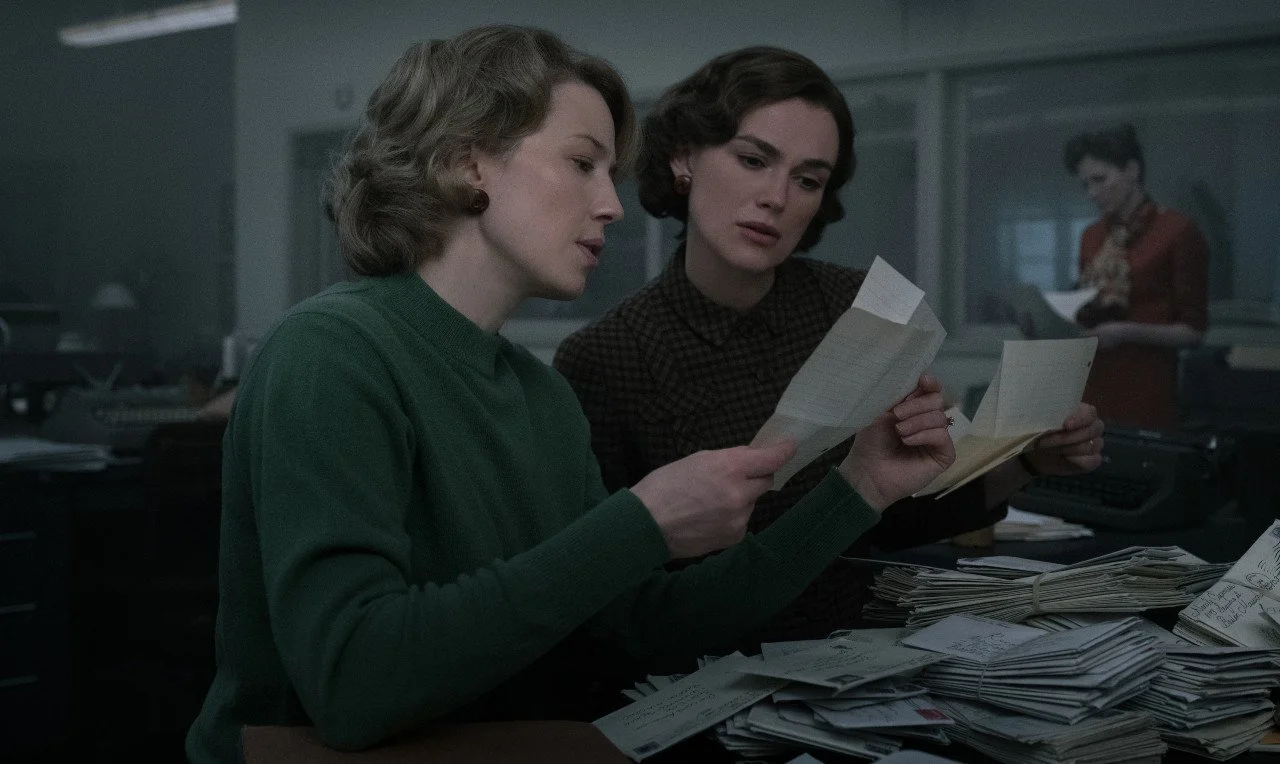Boston Strangler: Latest Remake Smartly Follows Female Reporters on the Case
By Thom Ernst
Rating: A-
When Jamie Lee Curtis tilted her head skyward, informing her late movie-star parents, Janet Leigh and Tony Curtis, of her recent Oscar win, I imagined them looking down, Leigh as the doomed Marion Crane in Psycho (1960), and Curtis as Albert DeSalvo in The Boston Strangler (1968).
And while Leigh’s Crane leaves an indelible mark in cinema, Curtis’ DeSalvo, although good, is arguably not as iconic. Still, it’s Curtis’ DeSalvo that looms large in my mind.
Uncertainty surrounds the strangler’s identity. Is the killer DeSalvo, who confesses to the crimes and is eventually arrested? (It is DeSalvo’s cellmate who relays the confession to his lawyer). Or is the strangler several people sharing similar M.O.s?
I remain certain the Boston Strangler is Tony Curtis. Such is the power of cinema on an impressionable young mind. (I was 10 when The Boston Strangler was released).
DNA testing has since confirmed DeSalvo’s guilt as the man who raped and killed 13 women, thus relieving the story of some of its mystery. Even so, if true crime junkies form a syndicate, then the Boston Strangler is sure to be their prime operation. It’s a story told many times over in as many ways, a factual tale varied in detail depending on who tells it and when.
On-screen, The Boston Strangler has been a police procedural, a courtroom drama, a crime drama, a speculative documentary, and, in No Way to Treat a Lady (1968), a comedy with Rod Steiger assuming a thinly disguised version of the strangler.
Now, in an unexpected twist, Disney+ steps in with Boston Strangler as a story of investigative journalism, and to no small degree, a story of fighting systematic misogyny. And while it seems inconsistent to mention Disney in the same sentence as the Boston Strangler, this telling of the story charts in as one of the more engaging versions even as it rubs familiarly close to She Said (2022), director Maria Schrader’s recent depiction of a journalistic battle against institutionalized sexism (and Harvey Weinstein) in the movie industry.
(Now and then I am struck with an impulse to stage double features. Boston Strangler pairs well with She Said).
Despite director Matt Ruskin’s Boston Strangler sharing a title with director Richard Fleischer’s 1968 shocker, Ruskin’s version is no remake. His focus veers from the strangler, casting lesser-known actor, David Dastmalchian in the title role.
Ruskin instead hones the audience’s attention on two real-life female journalists, Loretta McLaughlin (Keira Knightly) and Jean Cole (Carrie Coon), and the challenge they faced for the right to report on the story other papers ignored. (It is implied that given the victims are largely single elderly women, the story got overlooked).
This doesn’t render Boston Strangler any less gripping. If anything, it breaks from the routine camp of guilty pleasures that mar so many of these films, notably Netflix’s Ted Bundy film, Extremely Wicked, Shockingly Evil and Vile (2019) and Dahmer-Monster: The Jeffery Dahmer Story (2022).
If there are similarities between Ruskin’s film to other true-crime stories, it’s with David Fincher’s Zodiac (2007). But unlike McLaughin and Cole’s male counterparts who, in Fincher’s film, endure emotional and mental exhaustion, McLaughlin and Cole battle sexism and a patriarchal system—and endure emotional and mental exhaustion.
At first, McLaughlin is confined to reviewing kitchen appliances. She longs to ditch the lifestyle desk for something meatier on the crime desk, manned (literally) by a bunch of hard-nosed news veterans who spend as much time in the local watering hole as they do on the crime desk. (Not that McLaughlin and Cole are strangers to the bar scene).
It’s McLaughlin who breaks the story of a serial killer targeting elderly women and coins the name The Boston Strangler. It takes some doing to convince her editor (Chris Cooper turning in a grumpier Perry White performance) and then to break down the walls that bar her from crime scenes and police interviews. At least her husband (Morgan Spector) gives off a supportive vibe.
Most of the story is McLaughlin’s and Knightley steps up into the role with strong convictions and heated determination while not stumbling unconvincingly out of sorts with the reality of the era. This is the 60s effectively captured in setting and in design, so McLaughlin moves stealthily through a barricade of ignorance and an assumed male hierarchy.
Ruskin gives a fresh bend to the story of the Boston Strangler, and indeed to the true-crime genre. There are plenty of true crime films to entertain, but few that reach alongside the likes of Richard Brooks’s In Cold Blood (1967), in Fincher’s Zodiac (2007), and in his abandoned television project, Mindhunter. Ruskin’s Boston Strangler belongs on this list.
And even though there is sufficient evidence to lay guilt on DeSalvo, which Ruskin’s film confirms, I’m not yet ready to let Tony Curtis off the hook. Sorry Jamie. And congratulations on your win. I’m sure your parents are proud.
Boston Strangler. Directed by Matt Ruskin. Starring Keira Knightly, Carrie Coon, Morgan Spector, David Dastmalchian and Chris Cooper. Streaming on Disney+ beginning March 17.



